Q&A w/ DOUG FINE, Author of TOO HIGH TO FAIL: Cannabis and the New Green Economic Revolution
Written on June 25th, 2013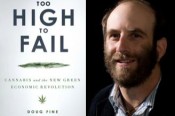 |
Aired: 06/23/13
This week, in the second of a two-part series (Part One with CARL HART, author of HIGH PRICE: A Neuroscientist’s Journey of Self-Discovery that Challenges Everything You Know about Drugs and Society) I’m joined by DOUG FINE to talk about the accelerating movement to change the rules on marijuana. According to Fine, as the economy continues to limp along for most Americans and California cities declare bankruptcy, one action — the legalization of marijuana — would save government billions per year while raising huge sums in taxes. According to TIME, the legal medicinal cannabis economy already generates $200 million annually in taxable proceeds from a mere five hundred thousand registered medical users in just sixteen states. 51% of Americans support full legalization (cannabis regulated for adults like alcohol), and 80% support medicinal cannabis legalization.
Fine’s book, TOO HIGH TO FAIL: Cannabis and the New Green Economic Revolution, is just out in paperback. In a postscript added to the new edition, Fine writes,” On November 6, 2012, Colorado and Washington voters ended the Drug War. That is to say, voters in both states overwhelmingly legalized adult social use of cannabis (Colorado’s new law, vitally, also allows industrial cannabis cultivation). It is no stretch to say that the Berlin Wall of the Drug War fell.” We’ll talk about how quickly the landscape is changing and look ahead to the era of legal marijuana.
Q&A w/ author, Carl Hart – HIGH PRICE: A Neuroscientist’s Journey of Self-Discovery that Challenges Everything You Know about Drugs and Society
Written on June 18th, 2013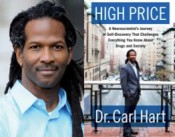 |
Aired: 06/16/13
This week’s guest, neuroscientist CARL HART grew up in one of Miami’s toughest neighborhoods and, in his first book, HIGH PRICE, he explores how it is that he avoided becoming one of the crack addicts he now studies.
Columbia University’s first tenured African American professor in the sciences, Hart goes beyond disputing myths, falsehoods, and ignorance about drugs, drug users, and drug policy. He has been engaged in cutting edge research since the late 90s, testing individuals with actual drugs. His controversial work is redefining our understanding of addiction. He examines the relationships between drugs, pleasure, choice, and motivation, both in the brain and in society. Hart’s findings shed new light on issues of race, poverty, and drugs, and help explain perhaps more clearly than ever why current policies are doomed to fail.
www.highpricethebook.com
Q&A w/ DIRECTOR, ROBERT GREENWALD and TWO WHISTLEBLOWERS
Written on May 28th, 2013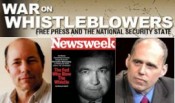 |
Aired: 5/26/13
How difficult is it to be a government whistleblower these days? A dozen years after 9/11, with a former constitutional law professor in the White House, the sad news is that to expose government negligence or illegality is to jeopardize one’s career and life savings.
The newest documentary from producer and director ROBERT GREENWALD and Brave New Films, WAR ON WHISTLEBLOWERS: Free Press and the National Security State highlights the stories of four individuals who felt compelled to reveal acts of government illegality and violations to the U.S. constitution in the military industrial complex in the years following 9/11. In the film, whistleblowers, journalist and experts share what happens when the government punishes those who stand up to demand accountability and defend the constitution. Such actions and the atmosphere they engender has a chilling effect on the speech rights of citizens and the free press. This week I speak about all of this with GREENWALD as well as with two of the courageous whistleblowers featured in the film, THOMAS TAMM and FRANZ GAYL.
www.waronwhistleblowers.com
www.bravenewfilms.com
Q&A w/ DANNY KENNEDY, ROOFTOP REVOLUTION: How Solar Power Can Save Our Economy and the Planet from Dirty Energy
Written on May 13th, 2013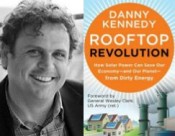 |
Aired: 05/12/13
Is there a revolution coming to your rooftop? While opponents claim solar is expensive, inefficient, and unreliable, in his book ROOFTOP REVOLUTION: How Solar Power Can Save Our Economy And Our Planet From Dirty Energy, DANNY KENNEDY makes clear solar can save money, create jobs, and protect the environment if only politics and perception will get out of the way.
During the recent Presidential campaign, we heard a lot about Solyndra, the solar start-up that received a sizable government loan only to go belly up. Solar’s detractors claim the collapse of Solyndra proves solar is just a hippie pipe dream, but Danny Kennedy, says the truth is quite the opposite. Solyndra failed because it wasn’t able to compete in a red-hot industry, not because solar isn’t ready for prime time.
The industry employs 100,000 people in the United States, twice as many as in 2009 and twice the number of coal miners. In 2011, Warren Buffett invested $2 billion in a solar farm, and General Electric bought a start-up solar manufacturer, announcing, “By 2020 this is going to be at least a $1 billion product line.” Production of solar-generated electricity rose by 45% in the first three quarters of 2010, while electricity from natural gas rose only 1.6% and coal declined by 4.2%. Kennedy argues for a rooftop revolution to break the entrenched power of the coal, oil, nuclear, and natural gas industries and their progress-denying allies.
www.rooftoprevolutionbook.com
www.sungevity.com
Q&A: Mark Mykleby, Natl Security=Sustainability
Written on April 8th, 2013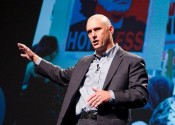 |
Aired: 04/07/13
In the preface to an article entitled A National Strategic Narrative, Anne-Marie Slaughter of Princeton says we need a narrative that confronts some of the following questions, “Where is the United States going in the world? How can we get there? What are the guiding stars that will illuminate the path along the way? We need a story with a beginning, middle, and projected happy ending that will transcend our political divisions, orient us as a nation, and give us both a common direction and the confidence and commitment to get to our destination.” She also writes, “In one sentence, the strategic narrative of the United States in the 21st century is that we want to become the strongest competitor and most influential player in a deeply inter-connected global system, which requires that we invest less in defense and more in sustainable prosperity and the tools of effective global engagement.”
Over time, the best way to shape the force of the future is to invest in the science, technology, education, and training that will equip our soldiers, sailors, airmen, and marines to adapt to an increasingly complex and dynamic environment. The hardware and software we buy and build are secondary to the gray matter we must cultivate now.
When I hear that someone high up in the military is talking seriously about sustainability, I take notice.
www.newamerica.net
